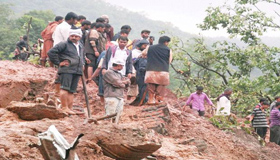To save the planet, first save elephants
Wiping out all of Africa’s elephants could accelerate Earth’s climate crisis by allowing 7% more damaging greenhouse gases into the atmosphere, scientists say. But conserving forest elephants may reverse
Wiping out all of Africa’s elephants could accelerate Earth’s climate crisis by allowing 7% more damaging greenhouse gases into the atmosphere, scientists say. But conserving forest elephants may reverse

Farmers, horticulturalists, agricultural officials and scientists are optimistic about the proposed Rs 1,000 crore funding by the World Bank for the horticultural post-harvest modernisation project.
A new study led by Bart Verheggen surveyed 1,868 scientists studying various aspects of climate change, asking them several questions mainly focused on what’s causing global warming. They survey also asked
Scientists are frantically looking for new ways to combat global warming. And now a team has created a sponge that absorbs carbon dioxide, which many scientists say plays a key role in heating up our
Scientists in South Korea say they have found a way of converting used cigarette butts into a material capable of storing energy that could help power everything from mobile phones to electric cars.
A team of scientists at the University of Sheffield have developed a spray-painting method for applying new, cost-effective solar cells. The scientists utilized new perovskite solar cells - which have
Gentically modified plants which contain health boosting Omega-3 have been created by British scientists and will be harvested with weeks Prof Jonathan Napier with very small crop of GM Camelina : First

Following the preliminary assessment made at the site of the landslide in Malin, scientists of the Geological Survey of India (GSI) have recommended that the authorities evacuate the houses adjacent to
The American astrophysicist defended genetically modified organisms, saying that they are just an extension of artificial selection He claims that practically every type for food for sale is genetically
Large spikes of methane being released into the atmosphere above Siberia may be tied to the mysterious craters which have appeared in the landscape, according to a US scientist. Dr Jason Box, a professor
Industrial pollution had reached the South Pole 20 years before man had set foot on to it, confirmed a study on lead pollution over the southernmost continent in Earth. The first men to arrive at the South